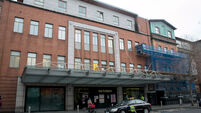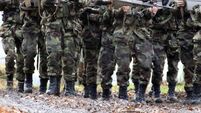National archives release state documents from 1984

The Government decided to provide one last large-scale tranche of funding for the Irish Steel plant at Haulbowline, Co Cork, in 1984 in a bid to avert its closure.
Cabinet papers from 1984 show the minister for industry John Bruton sought approval in June that year to invest £89m in equity in the steel plant.
Mr Bruton told his ministerial colleagues that Irish Steel had been informed that no further investment would be forthcoming and that the Government would recommend its closure if it was unable to pay its debts as they fell due.
However, a Government memo showed one civil servant had described the promise of no further funding as “a pointless hostage to fortune” as it was impossible to say if circumstances might change in the future.
Mr Bruton also required two additional places to be created on the Irish Steel board to accommodate both a civil servant from his department and one from the Department of Finance.
The situation had become critical for the Haulbowline plant as a Government memo showed that the company’s prospects were “extremely slim.” In addition, under EEC rules all state aids to the steel industry had to be phased out by December 31, 1984.
In deciding to seek Cabinet approval for further investment in Irish Steel, Mr Bruton noted that the cost of the immediate closure of the plant would be approximately £100m — an option recommended by the minister for finance, Alan Dukes, who did not believe the company could achieve its sales, price and profit projections.
However, Mr Bruton said he thought there was some chance that Irish Steel could meet some of the targets needed for the plant to become viable by 1987.
The Government was also told the proposed £89m investment in Irish Steel would need the approval of the European Commission which were seeking a further examination of the company because of concerns over its viability.
A memo prepared for then taoiseach Garret FitzGerald also advised him that there was no case for closing Irish Steel in advance of a number of crucial EEC decisions which, if favourable, could make the continued operation of Irish Steel a sound investment.
It also described a new plant at Irish Steel as “a terrible mistake” which the Government needed to make clear publicly. It recommended that any member of the Irish Steel board who could be held partly responsible for the decision to proceed with the new plant should be dismissed.
To assist Irish Steel, Mr Bruton also sought Cabinet approval for the ESB to be instructed to offer lower electricity rates to large industrial users. However, the proposal was opposed by Mr Dukes and the minister for energy, Dick Spring because of the ESB’s own weak financial position at the time.
Mr Bruton argued that Irish Steel was unlikely to become viable unless it obtained a major reduction in its electricity costs which he described as “an essential element for the continued operation of Irish Steel.”
State papers show that in a major review of struggling industries in the Cork Harbour area in 1982, Irish Steel was identified as the only industry which appeared to have any potential to make a significant contribution to the Irish economy. Other firms examined as part of the review included the Verolme Cork Dockyard, NET, and the Whitegate oil refinery.
The review commented: “The relative favourable prospects for Irish Steel are in contrast to the public perception of this industry.”
The Government formally approved Mr Bruton’s recommendation to invest £89m in Irish Steel with £50m of the funding made available immediately.
Irish Steel was eventually sold by the State to Indian tycoon Lakshmi Mittal for £1 in 1995.
The plant operating under the rebranded name Ispat shut in June 2001 with the loss of 450 jobs.

The Government decided to cease any further financial support for the development of Knock Airport at the end of 1984 amid concern that it would end up paying the full cost of the project.
The minister for communications, Jim Mitchell, sought Government approval to cease all State funding to Knock Airport in November 1984.
Archives show the minister for finance Alan Dukes was also concerned that the State should cease all links with the airport as they could otherwise lead to further demands for financial support.
They also reveal that several west of Ireland TDs including Enda Kenny, Jim Higgins and Padraig Flynn lobbied the Government to fund the entire project.
The Government had contributed £9.9m towards the development of the airport — now known as Ireland West Airport Knock — but were aware a further £3.5m was needed to complete the project.
In a memo to the Government, Mitchell noted that the promoters of the airport — led by the parish priest of Knock, Monsignor James Horan — had made no financial contribution to the development of the airport.
Mitchell said that while the fact that the State had ended its financial involvement in Knock Airport had been conveyed in unequivocal terms to Mgr Horan, the reality of the situation did not seem to have been accepted by him.
He informed his Cabinet colleague that Mgr Horan especially harboured an idea that a legal action could be taken to force the Government to complete the project based on an earlier grant agreement drawn up in 1981. Mr Mitchell also criticised the action of Mgr Horan to pay contractors who had begun work on the construction of a terminal building out of donations which he had been seeking from the public as a method of inducing the Government to pay for the work.
Former taoiseach John Bruton clashed with the minister for foreign affairs Peter Barry over his support for the export of military equipment to Iran, Iraq and Libya in 1984.
However, Mr Bruton who was the minister for industry, trade, commerce and tourism at the time, opposed a similar application to export the same type of equipment to South Africa.
State papers show Mr Bruton believed the refusal of permission to export aircraft arrester systems to Iran, Iraq, and Libya, would cause redundancies or the possible closure of the Befab Safeland plant in Shannon, Co Clare.
“The reality is that export opportunities so foregone by Irish interests would be seized upon by other suppliers,” reasoned Mr Bruton.
However, his proposal was opposed by Peter Barry, who was concerned that Iran and Iraq were at war with each other and that the export of the equipment to Libya would arouse animosity by the US.
Mr Bruton said if the US did not want such goods to be exported, they could instruct Befab Safeland’s parent company in the US to ban the sale of such equipment to Libya or put them on a list of banned goods themselves.
Mr Bruton noted that he was not obliged to consult with the minister for foreign affairs under the Control of Exports legislation unless he wished to prohibit the export of specific goods to specific countries.
Mr Barry informed his Cabinet colleague that such equipment was used almost exclusively for military aircraft “and in particular, combat fighter aircraft.”
He argued that such equipment as a general policy should not be exported to countries in areas of tension or whose regimes were grossly repressive of human rights.
However, Mr Bruton was adamant that Ireland should not be “pursuing displays of high-mindedness”.
He claimed a refusal of the application to export such equipment to Iran, Iraq and Libya would amount to “commercial naivety”.
Mr Bruton said such decisions could also have a profound effect on industrial development in Ireland as overseas investors observed which countries were imposing unreasonable restrictions on trade.
Although he was far from convinced the United Nations embargo on the sale of arms to South Africa covered the export of Befab Safeland’s aircraft arrester system, Mr Bruton said he would refuse the export application “in the spirit” of the UN resolution.
The Government became concerned about the re-emergence of links between Libya and the IRA following the killing of a police woman outside the Libyan embassy in London.
Remarks by the Libyan leader Muammar Gaddafi in the aftermath of the shooting in London indicated his intention to restore Libya’s “friendship” with the IRA.
The Government had believed that links between Gaddafi’s regime and the IRA had largely ceased since the arrest in March 1973 of several men off Helvick Head, Co Waterford, in a boat carrying a shipment of Soviet arms from Tripoli.
State papers claims the relationship between Libya and the IRA declined markedly from 1975 onwards due to pressure from the Irish and British governments and a desire by Libya for a better relationship with both countries as well as disputes with the IRA and a visit by a UDA delegation to Libya.
However, officials from Britain advised their counterparts in Ireland in 1984 that the Libyans had not yet decided to “translate rhetoric into action”.
Civil servants in the British foreign office also believed that any support by Libya for the IRA would be “slow and small”.
The issue became important as the Government was coming under pressure from Libya to buy its oil in return for increases exports of Irish cattle and beef.
Archives show senior civil servants in the Department of Foreign Affairs were “perturbed” at Gaddafi’s remarks about renewing support for the IRA.
When Garret FitzGerald and Margaret Thatcher met in November 1984, it was under the shadow of the Brighton bombing. She had been willing to come to Ireland for the summit, but the idea was dropped for security reasons. They met at Chequers instead.
“The tone of the meeting was at times particularly robust,” according to cabinet secretary Dermot Nally. “Before she committed herself to any generalities she wanted to know what exactly they meant,” she explained. “She had a bad experience, through not following this rule, on previous occasions.”
One such occasion was her meeting at Dublin Castle with taoiseach Charles Haughey in December 1980.
Mrs Thatcher and Dr FitzGerald discussed the British idea of a Security Commission during a plenary session, The commission she was talking about would be an advisory body in which the southern representatives could raise anything.
When she raised the idea of a Security Commission in which general consultations would be institutionalised, she felt the Republic should respond by removing Articles 2 and 3 from the Irish Constitution.
“It has been a good meeting,” she said. “I think it is the first time that we have got to grips with the problem and talked about the real issues.”
The taoiseach was obviously uneasy, as they had decided nothing. He called for another summit early in the new year.
“Garret, you look depressed,” she said. “Is it that bad? I am not depressed. We’re now tackling the problem in detail for the first time.”
“All that could be snuffed out next May,” Dr FitzGerald said. “Despite what they are now saying, the IRA could come back into the field, stand at the local elections and overwhelm the SDLP, who would probably not be able to survive.”
Before the meeting concluded Mrs Thatcher mentioned Articles 2 and 3 of the Constitution.
“What am I to say if I am asked by the press if we discussed it?” she asked.
“We have asked the British Government not to exclude anything in these talks,” Dr FitzGerald said. “In logic therefore we, on our side, cannot exclude anything. That has seen me through so far.”
“Then I could say that you are not excluding anything,” Mrs Thatcher replied.
“Yes,” the taoiseach agreed, “but only if, at the same time, you say that you are not excluding anything.
“I better stick to what you say,” she concluded.
The meeting ended amicably, but the concluding exchanges were ironic in the light of what happened immediately afterwards at Mrs Thatcher’s press conference.
All went smoothly until she was asked if the British Government was ruling out, for the foreseeable future, the three main options outlined in the Forum Report?
At that point she obviously forgot that she had agreed not to rule out anything at the press conference: “I have made it quite clear, and so did Mr Prior when he was Secretary of State for Northern Ireland, that the unified Ireland was one solution; That is out. A second solution was confederation of two States; that is out.
A third solution was joint authority; That is out. That is a derogation from sovereignty. We made that quite clear when the Report was published, Northern Ireland is part of the United Kingdom. She is part of the United Kingdom because that is the wish of the majority of her citizens.”
Her brutal dismissal of the Forum Report caused embarrassment all round, except in Unionist circles in Northern Ireland.
A request by Libya in 1984 to open a small consulate in Dublin caused a major diplomatic headache for the government.
State papers show the Irish authorities were highly concerned at the proposal given the Libyan regime under Muammar Gaddafi had supported the IRA during the 1970s.
“It is likely that the IRA in Ireland will look to a Libyan diplomatic office for support and assistance, and that Libya will respond,” an internal report on the issue stated.
“The present Libyan government has shown itself elsewhere to be no respecter of diplomatic propriety.”
Senior officials were also worried that an embassy would become a centre for terrorist activities involving Middle East nationals.
The Anglo-Irish division of the Department of Foreign Affairs said it would be inadvisable to allow a large increase in the number of students from Libya to Ireland following the fatal shooting of a British policewoman outside the Libyan embassy in London earlier that year.
Officials warned that Ireland could be seen to be exploiting and seeking profit from Britain’s difficulties with Libya.
There was also a danger that Libyan students might be used for political purposes by their government.
In October 1984, Libya suspended all live cattle and beef exports by Irish supplier Purcell Exports, seemingly to seek a better trade balance with Ireland.
Peter Barry, the foreign affairs minister, was informed that buying oil from Libya appeared to be an important way of resuming Irish meat exports to the country. However, officials said buying oil from Libya was undesirable given exceptional turmoil in international oil markets.
Taoiseach, Garret FitzGerald expressed regret at the lack of suitably qualified women to sit on the board of State agencies in 1984.
Dr FitzGerald said that while there were undoubtedly women of considerable calibre available for appointment to decision-making levels, their numbers were “still unfortunately limited.”
In a letter to the National Women’s Talent Bank, the Taoiseach said it was regrettable that it was not always possible to find a woman with appropriate qualifications for appointment.
Dr FitzGerald said that to appoint women solely on the basis of their gender would be “the type of tokenism which could in the long run do harm to the improvement in the status of women”.
There was only one woman minister in the Government led by Dr FitzGerald between 1982 and 1987 — the minister for education, Gemma Hussey.












